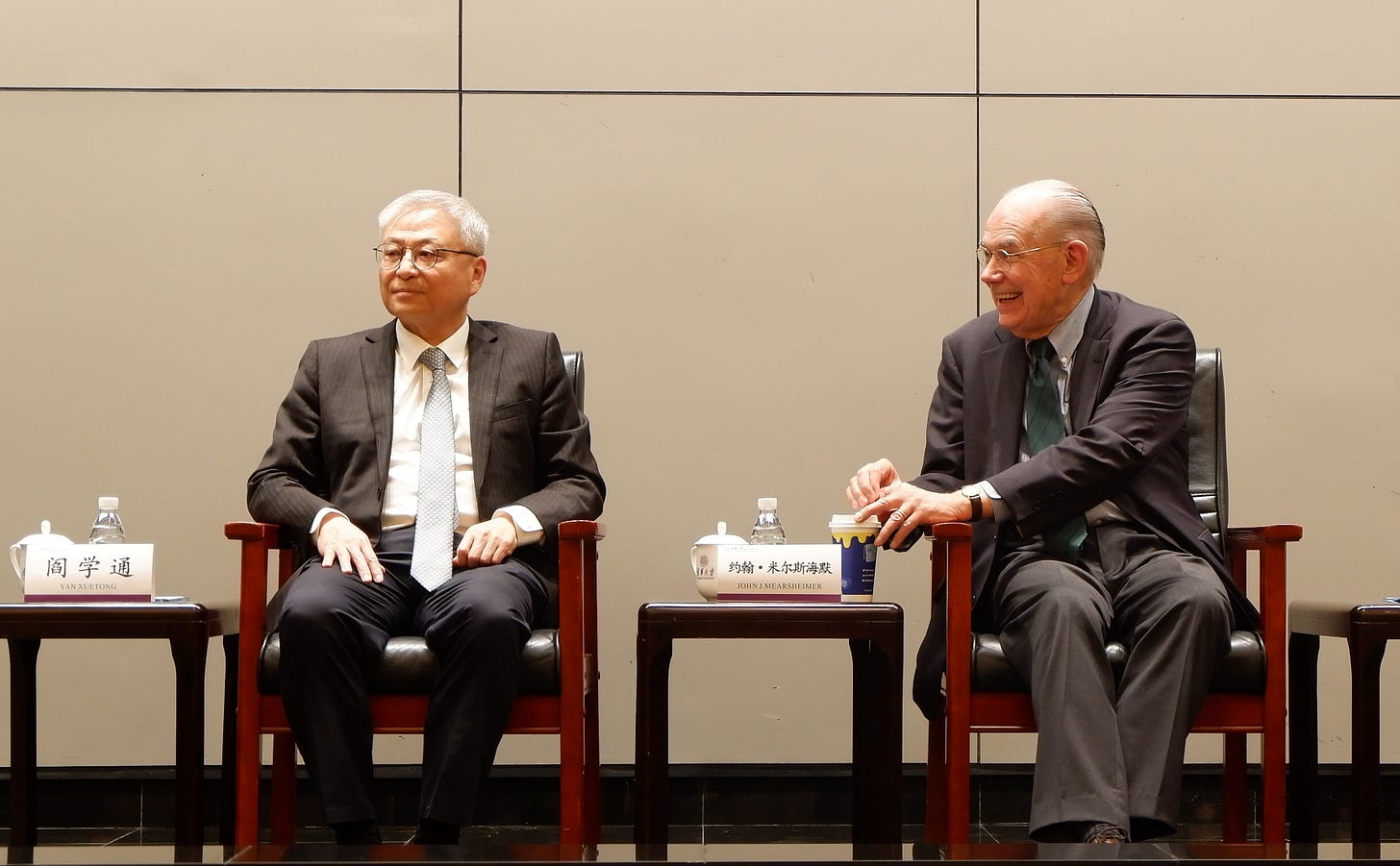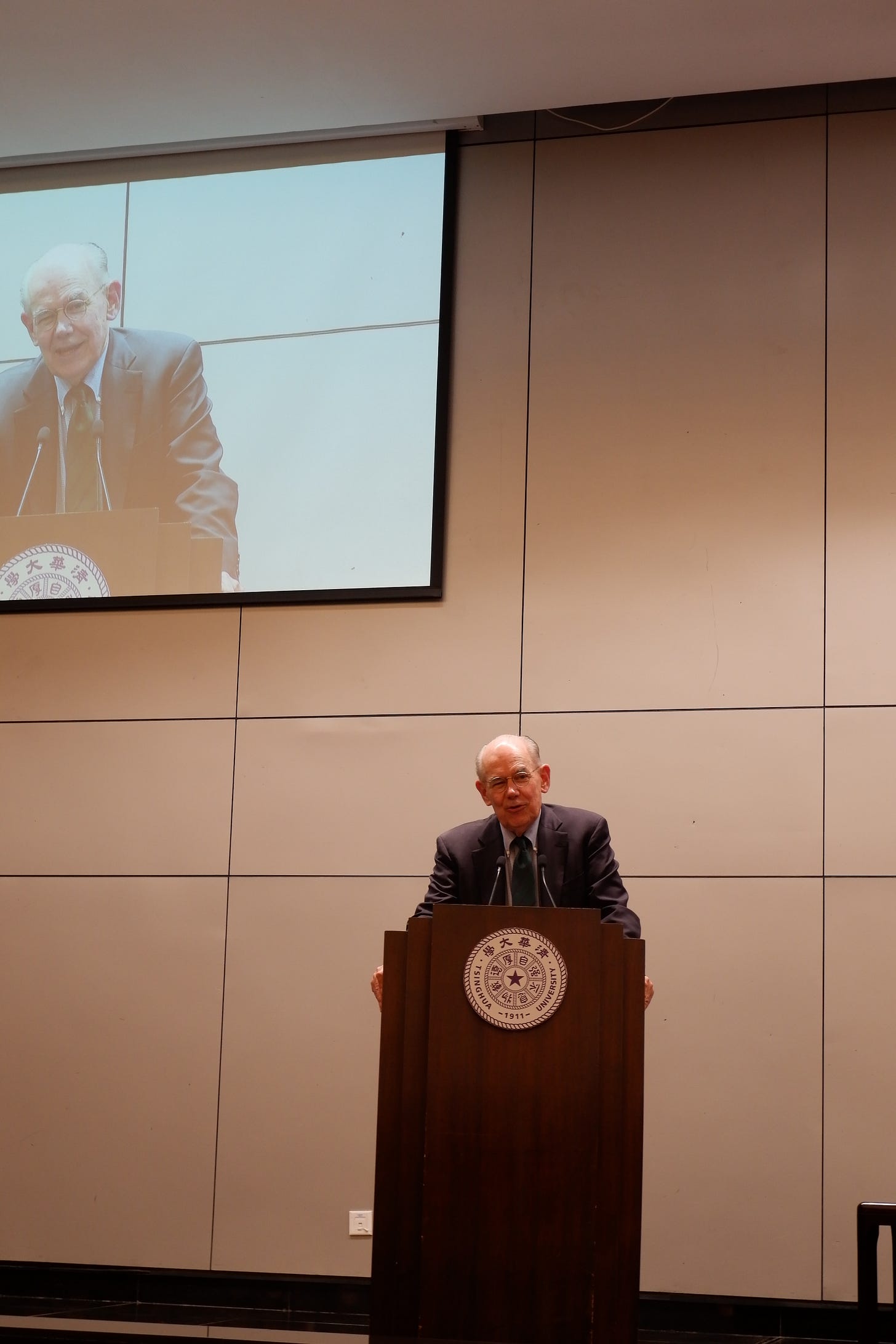"American Israel Policy is foolish":Debate Between Mearsheimer &Yan Xuetong
Leading Realist Scholars from China and the U.S. Engage in a Thought-Provoking Q&A Session
Recently, Mearsheimer made his first trip to China since the pandemic and received a welcome befitting a pop star. During his visit to Renmin University, due to the overwhelming number of registrants, the school was forced to relocate the event to the largest room available. Even so, the space barely sufficed to accommodate the throng of eager students who came to listen to his speech. Mearsheimer encountered similar scenes of fervent interest and packed auditoriums during his visits to Peking University and Tsinghua University.
John Mearsheimer Signing Books in Tsinghua University
“America's support with Israel in Gaza genocide it’s strategically foolish in the extreme it is morally bankrupt.” John Mearsheimer comment in Tsinghua University, this realist theorist from the University of Chicago once again told the truth about U.S. foreign policy.
This comment appeared in the third debate between John Mearsheimer and Professor Yan Xuetong, dean of the Institute of International Relations at Tsinghua University, on Oct. 11th. Yesterday, Clarence Gu from Southern Weekly published the speech transcripts on ChinAffair+. The following is a Q&A session of about 45 minutes.
is a newsletter founded by Dr., he is a fellow and head of the U.S.-EU program at the Center for International Security and Strategy (CISS), Tsinghua University. I really enjoyed reading the article he picked.During the question and answer session, Mearsheimer took the lead in discussing the definition and connotation of leadership with Yan Xuetong.
Yan Xuetong believes that leaders are crucial to a country's policies.
Taking advantage of the heat of the Palestinian-Israeli conflict, Yan Xuetong asked Mearsheimer about the US policy towards Israel. Sure enough, Mearsheimer admitted that U.S. Israel policy is terrible.

M= Mearsheimer
Yan=Yan Xuetong
No Major Power Leader Satisfied with the Existing Power
M:
Now, I want to talk about leadership in that context. I leave leadership out of my theory. I'm gonna fix saying now that it's not irrelevant. It just doesn't matter very much, but for Professor Yan, you are Leadership matters.
I want to tell him my theory of leadership, I am put into in terms of my own theory and ask him what he thinks about that, and ask him about if I am wrong; what is special about leadership that I don’t understand that he understands?
My theory says leadership is very important, and leadership goes to the most powerful state in the system. Leadership is all about the balance of power.
So when Professor Yan says the states, once they established their position in the balanced power, compete for leadership. I say to myself, no, states never satisfied with their position in the balance of power. They always want more power. What you're doing is competing for leadership.
Remember what I said about the emerging international orders and the collapse of the order that existed during the Unipolar moment, the United States led that international order is now collapsing. It wrote the rules. As china grew more powerful, it wanted to write the rules, or revise the rules. It wanted leadership in my story, because its power has grew.
So I would argue that I'm very curious what you have to say about this, that leadership can easily be incorporated into my theory of competition for power. I want you to explain why I'm wrong and what is special about leadership that I'm missing?
Yan:
Professor Mearsheimer is a very good question. What's the relationship between balance of power and leadership? I think we have one thing in common is that the balance power is defined by leaders, In his book, use the term decision makers. And it's not a state make decisions. It's those people who hold the power of the state make decision. So that's why we have to discuss about concerns the role of the human being.
Leaders are individuals, and they can be rational and irrational. State just instruments. Another, you cannot say the instrument is irrational or rational. So here, I would say why I concerned the leadership is place of moral than balance of power, because that’s balance of power really decided by the leadership. Like john said, he will agree with no leader in major powers satisfied with the existing power. They are hungry for more power, endless, and unlimitly.
Whenever they talking about the balance of power, he said, hey, the current balance of power is not in favor of us. We have to shift the balance of power, make the more balance toward us. No matter, even US becomes a unipolar, a leading power, they still concerned the balance of power is not that favorable. They still want to have more power.
So in that way, leadership decided it what kind of a balance of power they can achieve. They want to make the balance of power and in favor of them rather than in favor of others.
Second, because of the leadership wants more power, then depends on, that's a very critical in my theory that how to achieve more powers, even the type of leaders prefer different way to achieve more powers, just like all of us are greedy for money, but then we adopt different approaches to making money. So the most easy way to what is rob the bank, but most people do not prefer that way. That's really need to make it rich faster than other way, but I still prefer the other approach.
Leaders would decide that what kind of strategy to adopt for gaining more powers. That's why leadership is better than more power.
And also, I think there's the other things also important. The leaders, because I just write a brief from John’s new book HOW STATE THINKS, and the book has translated into Chinese version. I strongly recommend you to buy a piece of topic I do an ad for you. In this book, I think I can realize that the policy is not made by state but by decision-makers. Because of is made by decision makers. Then what happened? Some decision-makers are more rational than the others. We cannot believe all of those are equally rational either, so here I will say, people may have different references for category of the type of leader, how to character the leadership, but I would say definitely leaders, the leaders are different from each other. Thank you.
Moral leader, stable global order, immoral leadership, chaos!
M:
I want to ask you a question on this. When you talk about leaders, you can have two different means. One is the state, two is the individual. States is what i'm talking about. In other words, china wants to be a leader, the United States wants to be a leader with the competition between states. That's different than complications to individuals. You talk is not clear to me whether you're talking about states or individuals.
Yan:
Actually, in my book, the essence of leadership are divided into three level of the individual level, state level or system level.
Actually, my understanding and if we talk about the leadership of major powers, it connected all of the three of levels. Because their policy makers, there are individuals, because they hold the power of the state. They're also at the second level, we say that because the major powers, certainly the system level factors, right? Here my understanding and the leaders they are, the individuals are alive, that's what the target and worth of study. That's the one we decided. We try to understand why these guys make policy in that way. You want to try to understand why a state never made policy. You will find that in the US, when trump into power, he adopted very different politics from Obama. The US didn't change the same institution, same state, the same military capability, and same economic resources, and all the other factors, other variables controlled never change, but as soon as you get a new leadership, they adopted all the policies. That's why from my understanding, the leadership really matter.
M:
I want to ask another question. If you know the theory is supposed to be simple, when I listen to you, talk about how leadership affects international politics, it doesn't sound like you have a simple theory. Can you tell me in brief words, what your simple theory regarding leadership and the balance of power is?
Yan:
The simple description of my theory is that you have a moral leadership, you have a relatively stable global order. Otherwise, you have immoral leadership, it will be chaos.
I think most people read your book and maybe not the very latest one and they know your theory heavily focus on the system level. I think me and John influenced by Kenneth Walz.
So we think that international system do have an impact on policy maker or their major politics’ behaviors.
My question is that, and in your new book, you're talking about the rationalities. And when you concern rationalities, certainly is not applied to the states that rational state or irrational state, but the rational decision makers and irrational decision makers, I want to ask a question to you, how can you think about a rational from a system level analysis to individual or state analysis to the other levels?
America's Israel Policy is foolish
Yan:
Following this question, actually, I want to rise the book you wrote with Steve Watt. You can suggest White House policy towards Israel and mainly influenced by the Israel Lobby in the congress.
Now the question is that, currently, all the Republicans and Democrats concerns do not have a big difference in the policy towards supporting Israel's policy in Gaza, actually they kill lots of civilians there. And Steve Watt wrote an article said that for realist, we suggest when there is a contradiction between the reality and the interest you will get the priority to the interest. But for realist never suggest that you adopt a policy undermine both morality of international image and a national interest.
Today, I think most people believe the White House adopted a very irrational policy in terms of national interest. That policies are agreed by Trump and his people. The question is very simple. Do you think the common policy is rational or irrational?
M:
I think it's irrational, and I agree with everything you said. America's support with Israel in Gaza genocide it’s strategically foolish in the extreme it is morally bankrupt. It certainly contradicts basic realism logic. When I make the argument that this is not in our strategical interest, it is just no question about that.
Yan:
Last question is about why could state policy makers make an irrational policy for the leadership theory or the moral realism theory, we believe and the policy decision makers make irrational policy is not because of they have mental problems. It's because they care too much about their personal interests. Because they put their personal interests over national interest, so they adopt the policy undermine their national interest looks very irrational. So here I will ask you, because I think this is a really universal problem, people cannot understand why now American policy makers are so strongly and support the Israel unhuman behaviors in Gaza, what is you understand, and what drive to be so irrational?
M:
Just talking about irrationality in general, there are variety of factors explain why states are sometimes irrational. In the case of US policy towards Israel is largely result of the Israel lobby, which is an incredibly powerful interest rule in the US, basically forces any American president and Congress at this point to support Israel unconditionally. You will understand that the United States has a relationship with Israel. It has no parallel in modern history. There's no parallel in modern history for the US-Israel relationship, we support Israel unconditionally. This is when Israel done things that are not in strategical interest of the united states. the reason is very simple again, you have this domestic interest group the Israel lobby is incredibly powerful. If you have any doubts about it, you can read our book, this new book on the subject adopted by Israel scholar Iian Pappe I know that at least one case of somebody writing a new book it basically the argument that Steve and I made in our book in 2007.
But there are other cases of rationality do to domestic politics. Their view of the fact that sometimes policy makers have remarkable foolish ideas in their head about how the world works. And those foolish ideas get the policy makers into all sorts of problems.
What the cases that we are looking at in the book is Neville Chamberlain. In the case of he had a deal with Nazi German in period between 1937 and 1939. And when you look at Chamberlain thinking about how to deal with Nazi German, he just had we called bad theories in his head about how to deal with the problem. It wasn't a domestic lobby or interest group of domestic politics, for him trying to benefit personally. It caused him to behave in an irrational way. I can point to other examples as well of that sort. So there are a variety of factors that can cause a state to be an irrational.
Most of the time, the imperatives of the system, the structure forces states to behave rationally. That's the basic argument under the opinion of realism. My argument is most of the time, but not all the time, my theory will be correct. But again, you want to remember theory is the simplification of reality and research. They're not gonna be right all the time.







